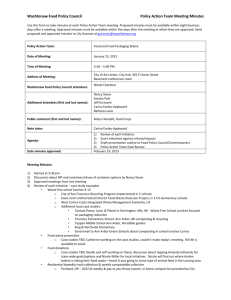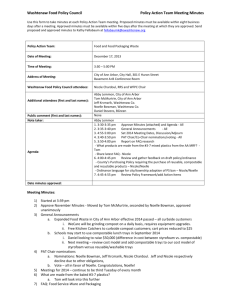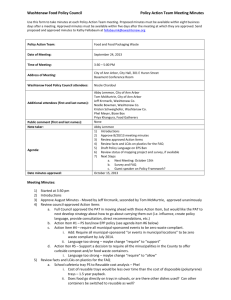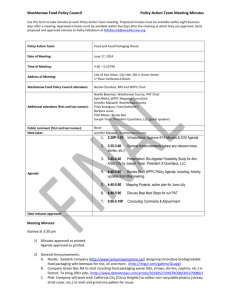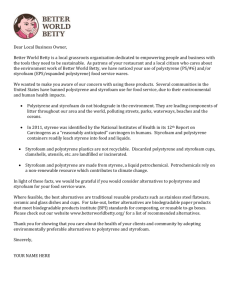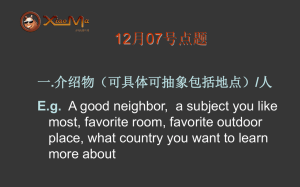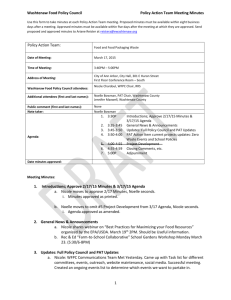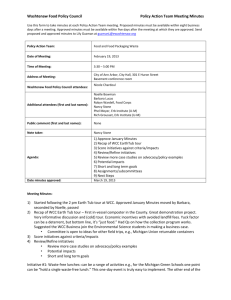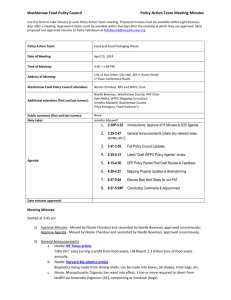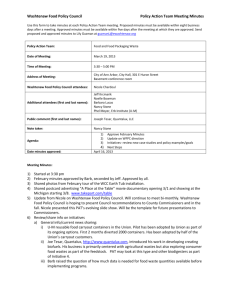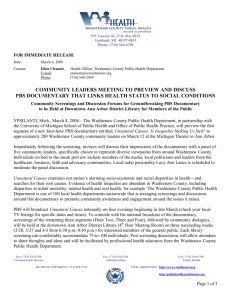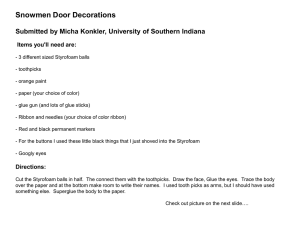October 15, 2013
advertisement
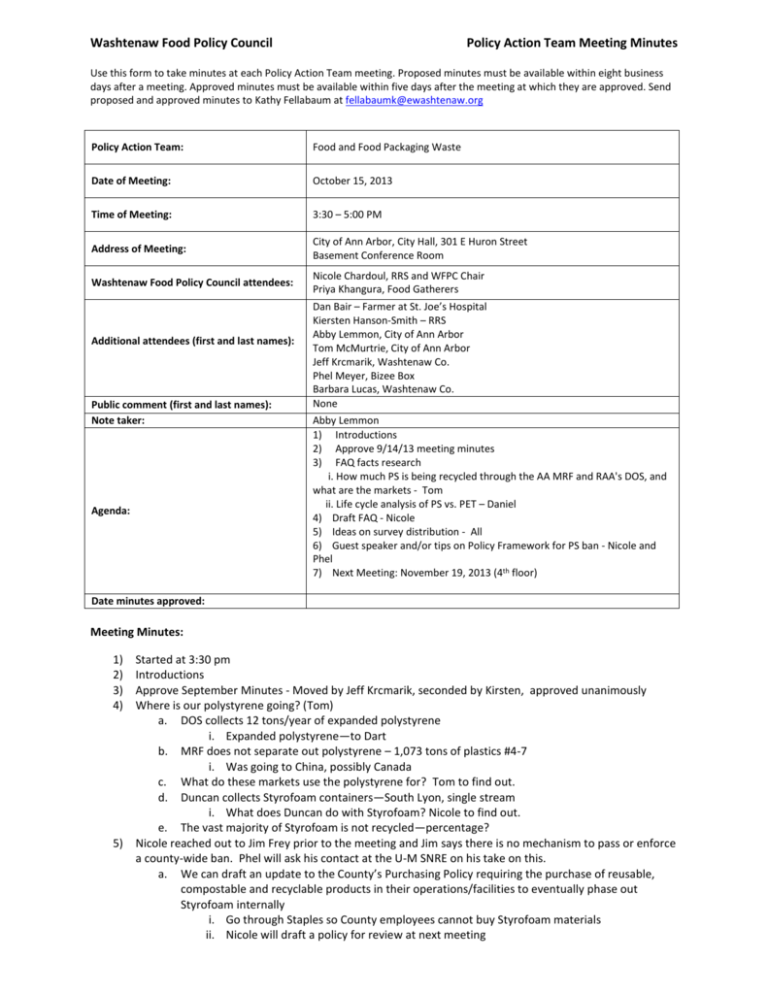
Washtenaw Food Policy Council Policy Action Team Meeting Minutes Use this form to take minutes at each Policy Action Team meeting. Proposed minutes must be available within eight business days after a meeting. Approved minutes must be available within five days after the meeting at which they are approved. Send proposed and approved minutes to Kathy Fellabaum at fellabaumk@ewashtenaw.org Policy Action Team: Food and Food Packaging Waste Date of Meeting: October 15, 2013 Time of Meeting: 3:30 – 5:00 PM Address of Meeting: City of Ann Arbor, City Hall, 301 E Huron Street Basement Conference Room Washtenaw Food Policy Council attendees: Nicole Chardoul, RRS and WFPC Chair Priya Khangura, Food Gatherers Additional attendees (first and last names): Public comment (first and last names): Note taker: Agenda: Dan Bair – Farmer at St. Joe’s Hospital Kiersten Hanson-Smith – RRS Abby Lemmon, City of Ann Arbor Tom McMurtrie, City of Ann Arbor Jeff Krcmarik, Washtenaw Co. Phel Meyer, Bizee Box Barbara Lucas, Washtenaw Co. None Abby Lemmon 1) Introductions 2) Approve 9/14/13 meeting minutes 3) FAQ facts research i. How much PS is being recycled through the AA MRF and RAA's DOS, and what are the markets - Tom ii. Life cycle analysis of PS vs. PET – Daniel 4) Draft FAQ - Nicole 5) Ideas on survey distribution - All 6) Guest speaker and/or tips on Policy Framework for PS ban - Nicole and Phel 7) Next Meeting: November 19, 2013 (4th floor) Date minutes approved: Meeting Minutes: 1) 2) 3) 4) Started at 3:30 pm Introductions Approve September Minutes - Moved by Jeff Krcmarik, seconded by Kirsten, approved unanimously Where is our polystyrene going? (Tom) a. DOS collects 12 tons/year of expanded polystyrene i. Expanded polystyrene—to Dart b. MRF does not separate out polystyrene – 1,073 tons of plastics #4-7 i. Was going to China, possibly Canada c. What do these markets use the polystyrene for? Tom to find out. d. Duncan collects Styrofoam containers—South Lyon, single stream i. What does Duncan do with Styrofoam? Nicole to find out. e. The vast majority of Styrofoam is not recycled—percentage? 5) Nicole reached out to Jim Frey prior to the meeting and Jim says there is no mechanism to pass or enforce a county-wide ban. Phel will ask his contact at the U-M SNRE on his take on this. a. We can draft an update to the County’s Purchasing Policy requiring the purchase of reusable, compostable and recyclable products in their operations/facilities to eventually phase out Styrofoam internally i. Go through Staples so County employees cannot buy Styrofoam materials ii. Nicole will draft a policy for review at next meeting Washtenaw Food Policy Council Policy Action Team Meeting Minutes Use this form to take minutes at each Policy Action Team meeting. Proposed minutes must be available within eight business days after a meeting. Approved minutes must be available within five days after the meeting at which they are approved. Send proposed and approved minutes to Kathy Fellabaum at fellabaumk@ewashtenaw.org b. Provide model policy language for adoption by City/Township to require use of reusable, recyclable, compostable packaging (Cities can use “ban” language if they want). i. Start with City internal operations, farmer’s market, events ii. Move to downtown restaurants and commercial businesses iii. It will start to infiltrate to the general population, especially with changes that will occur at the distributor/grocer/food service provider level. iv. Nicole will revise current daft language for use at the city/township level. 6) FAQ: Food Service Packaging (to be posted on County website and used as a leave-behind as downtown restaurants are surveyed) a. Q9: find facts for % of food service items is being recycled and composted (look at EPA website) and also try to find more facts about how much styrofoam is being recycled. b. Environmental friendliness of reusable/recyclable products depends on user. i. Recyclable plastic is only more environmentally friendly if the user actually recycles it. ii. Reusable cups—frequent washing causes them to break down. c. PLA is not compostable in Washtenaw County i. PLAs are commonly made with GMO plants 1. GMOs have adverse effects on human health and on the environment. ii. Paper-based packaging is preferred over PLA, but often more expensive. d. Environmentally preferable products, as determined by the PAT i. Reusable products have least adverse effects on environment ii. Compostable (uncoated paper) is more preferable than recyclable iii. Recyclable products are third choice iv. Poly-coated paper cups? Not accepted curbside, yet, but may be in the future for recycling. e. Start by asking Food Co-Op and other natural food stores to label preferred products f. Make a table of different products, comparing prices g. Educate people about PLA—why do restaurants use it when they can’t compost it? i. Build on the County’s website: www.RecycleMyPlastic.com 7) Next Meeting: November 19th 3:30-5 pm, 4th floor conference room, Ann Arbor City Hall 8) Meeting adjourned 5:00 pm
